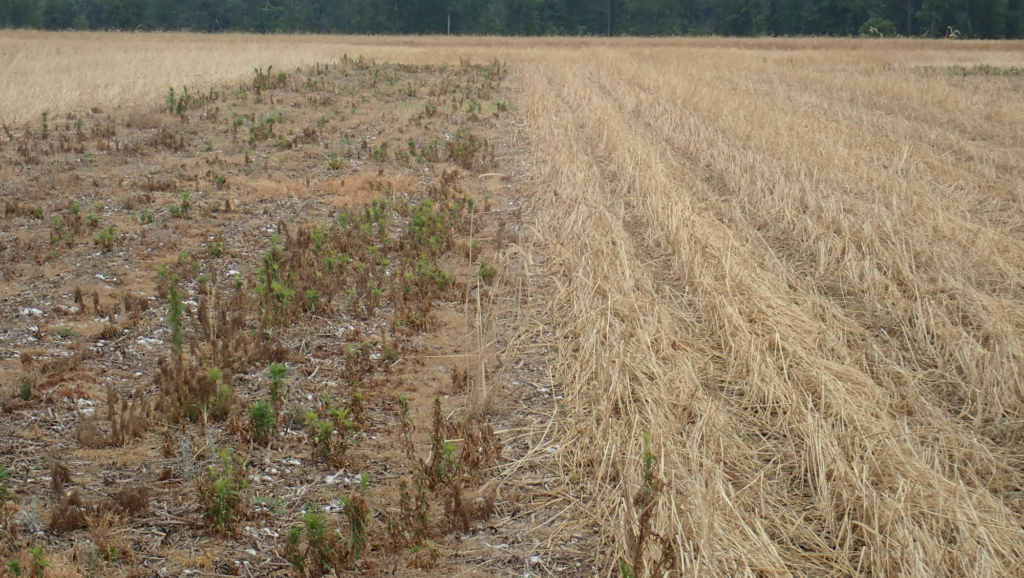Gearing Up for Cover Crops: Consider Weed Management Benefits
go.ncsu.edu/readext?726238
en Español / em Português
El inglés es el idioma de control de esta página. En la medida en que haya algún conflicto entre la traducción al inglés y la traducción, el inglés prevalece.
Al hacer clic en el enlace de traducción se activa un servicio de traducción gratuito para convertir la página al español. Al igual que con cualquier traducción por Internet, la conversión no es sensible al contexto y puede que no traduzca el texto en su significado original. NC State Extension no garantiza la exactitud del texto traducido. Por favor, tenga en cuenta que algunas aplicaciones y/o servicios pueden no funcionar como se espera cuando se traducen.
Português
Inglês é o idioma de controle desta página. Na medida que haja algum conflito entre o texto original em Inglês e a tradução, o Inglês prevalece.
Ao clicar no link de tradução, um serviço gratuito de tradução será ativado para converter a página para o Português. Como em qualquer tradução pela internet, a conversão não é sensivel ao contexto e pode não ocorrer a tradução para o significado orginal. O serviço de Extensão da Carolina do Norte (NC State Extension) não garante a exatidão do texto traduzido. Por favor, observe que algumas funções ou serviços podem não funcionar como esperado após a tradução.
English
English is the controlling language of this page. To the extent there is any conflict between the English text and the translation, English controls.
Clicking on the translation link activates a free translation service to convert the page to Spanish. As with any Internet translation, the conversion is not context-sensitive and may not translate the text to its original meaning. NC State Extension does not guarantee the accuracy of the translated text. Please note that some applications and/or services may not function as expected when translated.
Collapse ▲Before procuring your cover crop seed for planting this fall, please watch the video below on the potential weed management benefits of cover crops. In this video, Charlie Cahoon and Camp Hand (PhD student at University of Georgia) focus on weed suppression by cover crops.
Access Video Here: Cover Crops for Cotton Weed Management
This video is one in a series of videos from the Plant Management Network entitled “Focus on Cotton”.
Summary: To combat troublesome herbicide-resistant weeds, Extension weed specialists emphasize integrated weed management (IWM). This requires the use of physical, cultural, and biological weed management strategies in addition to herbicides. Cover crops can be the foundation of a strong IWM program. This webcast addresses cover crops for cotton weed management, focusing on results from Georgia, North Carolina, and Virginia. Topics include (1) why cover crops make sense in cotton production; (2) key points in maximizing weed suppression; (3) suppression of winter and summer annual weeds; (4) using cover crops to reduce selection pressure for herbicide-resistant weeds; (5) avoiding cotton stand issues; and (6) the value of cover crops in combination with herbicides.
Biography:
Charlie Cahoon is an Extension weed specialist and assistant professor at North Carolina State University. His research focuses on developing innovative and sustainable weed management solutions for corn and cotton. Additionally, at the forefront of his research are management of herbicide-resistant common ragweed, horseweed, Palmer amaranth, and Italian ryegrass and preemptive measures for preventing herbicide resistance. He is also committed to promoting proper stewardship of new herbicide technologies. Cahoon received both his BS and PhD from North Carolina State University. His graduate work was conducted under the direction of Alan York and David Jordan and focused on herbicide-resistant Palmer amaranth management in cotton.
Camp Hand is a PhD student studying weed science under the direction of Stanley Culpepper at the University of Georgia. Camp’s research projects have focused on reducing selection pressure for dicamba resistance in Palmer amaranth through integrated weed management strategies in cotton, tolerance of multiple vegetable crops to 2,4-D or dicamba applied over plastic mulch prior to planting, and herbicide-tolerance studies in cereal rye for grain production. Camp received his BS and MS degrees at Auburn University in horticulture while minoring in agronomy. His graduate work at Auburn was conducted under Wheeler Foshee, and it focused on weed control in watermelons and pecans.



